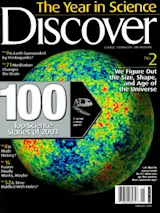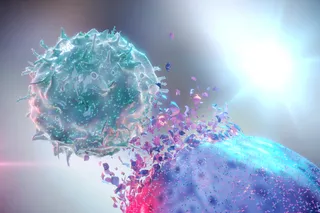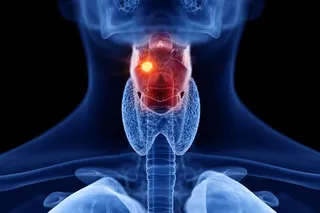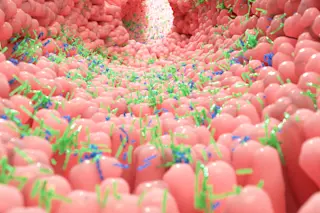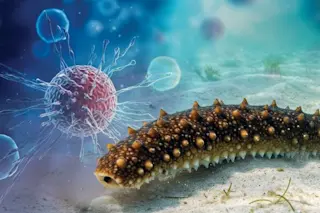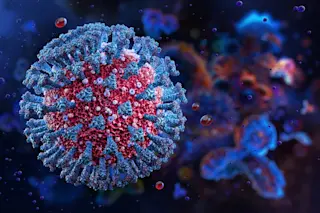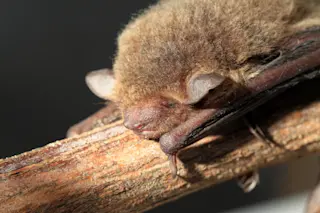SARS Storm Spurs Surprising Strategies
Last winter’s outbreak of SARS—severe acute respiratory syndrome—triggered an unprecedented emergency medical response worldwide. Researchers put aside scientific rivalries and within weeks not only discovered the coronavirus that was responsible but also mapped the virus’s genomic sequence. After the outbreak had been contained, writer Barry Yeoman asked top medical scientists to reflect on the long-term lessons of the crisis.
Malik Peiris, microbiologist, University of Hong Kong, member of the team that identified the SARS coronavirus: In the 1960s, many believed that infectious disease had been conquered, but that has been proven wrong yet again. Today the scale of the threat is more global. Jet travel has increased exponentially, so somebody can pick up the infection here in Hong Kong and be in Singapore or Toronto in a few hours’ time. You hear about the globalization of economy; this is the globalization of disease.
Jessie Gruman, social psychologist and president, Center for the Advancement of Health, Washington, D.C.: There was real reluctance on the part of the pharmaceutical industry to do research until they were sure that it would be worthwhile financially. The government brought together all the big companies and said, “Please, please, work on this,” and they walked away. Eventually, some took a chance and did the development work. That’s not to say the market is a bad thing. It’s just that this is the kind of place where the market falls short, and then people die in the meantime.
Sanjay Kapil, coronavirus expert, Kansas State University College of Veterinary Medicine, Manhattan, Kansas: We have learned that it is not a good idea to come into contact with wildlife. SARS came from eating exotic meat, specifically the civet cat. Monkeypox was imported with Gambian giant rats and dormice. Viruses do not appear out of the blue: They have been evolving for millions of years in strange niches. When you are exposed under circumstances that work for a specific virus, the species jump happens.
Mark Rothstein, bioethicist, University of Louisville School of Medicine, Louisville, Kentucky: We’ve found out that our public-health system is not equipped to handle an emergency of the magnitude of SARS. We don’t have the facilities, the people, the know-how, to implement any large-scale form of quarantine. What would have happened if we had had to isolate 10,000 people at home? We’ve got to have a way to get food to them and to make sure they’re obeying the quarantine orders. We’ve got to have a way to replace their income, so people who live from paycheck to paycheck don’t try to sneak out the back way to go to work. There are a whole range of issues that we need to consider.
W. H. Seto, chairman of infection control, Queen Mary Hospital, Hong Kong: The SARS outbreak has reaffirmed my faith that basic infection-control measures work. Nearly 400 health-care workers were infected in Hong Kong, but my hospital, one of the two big teaching hospitals in the city, had only two infections—by far the lowest number of any staff. We just practiced the basics: wear masks, isolate patients, and wash your hands.
Barry Bloom, dean of faculty, School of Public Health, Harvard University, Cambridge, Massachusetts: If the principal role of public health is preventing disease, it is not the smartest thing in the world to cut the infectious-diseases budget of the Centers for Disease Control, as Congress did this year. Despite all that we have learned about SARS, AIDS, and Ebola, the CDC, our major public-health institution, is getting kicked in the head, which puts us all at risk. How did the CDC get 300 or 400 people manning the phones, running to China, going to Vietnam and Taiwan during the SARS outbreak? They pulled everybody they could get their hands on off every other disease. They did a heroic job—but we became enormously vulnerable to other infectious diseases, or terrorism, or anything else.
Robert Garry, virologist engaged in envelope-protein research that may lead to a SARS vaccine, Tulane University School of Medicine, New Orleans: We’ve learned that it’s good to support basic scientific research. Coronaviruses had never been associated with lethal diseases in humans before. Nevertheless, work on those viruses had been supported by the National Institutes of Health and other places, so we knew quite a bit about this family of viruses before the outbreak, which meant we were in a better position to make vaccines that could prevent another outbreak. If the basic research hadn’t been done, SARS would have been a much more serious threat.
Michael Lai, molecular microbiologist, Keck School of Medicine of the University of Southern California in Los Angeles: Viruses are smarter than virologists.
Motherless Eggs Created in Lab
Stem cell researchers performed a laboratory feat this year that was once deemed unthinkable: the artificial creation of egg cells. “An egg is the most sophisticated cell in an organism, carrying the genes from one generation to the next,” says Jose Cibelli, a biotechnologist at Michigan State University. The work was done with mice. But if the same can be done with human cells, the implications are extraordinary. Scientists would have an infinite supply of eggs for cloning vital tissues or organs and conducting fertility research—without needing human donors.
A team of developmental biologists led by Hans Schöler and Karen Hübner at the University of Pennsylvania placed densely packed clusters of stem cells from mouse embryos in a petri dish, using fetal calf serum as a growth medium and adding a gene protein that turns green when germ cells form. After four days, green flecks started appearing, “like a GPS system telling them where the eggs were,” says Cibelli, who observed the experiment. Just days later, the germ cells matured into egg follicles. Schöler and his team then found further proofs that the eggs were functional: the presence of estradiol, a chemical produced only in the follicles; meiotic chromosome division; and, by adding the hormone gonadotropin, simulated ovulation.
Schöler is confident it will eventually be possible to create test-tube human eggs. How viable the eggs may be remains to be seen, but the ultimate hope is that they be could be used to produce an infinite, affordable supply of embryonic stem cells. Those primordial cells, in turn, could conceivably be used to treat Parkinson’s and other cell-based diseases, as well as to clone vital tissues and transplantable organs. “In the past, we had to rely on women to donate eggs for this research,” says Schöler. “And that’s when you run into ethical issues such as the commercialization of human beings.”
Other scientists think creating test-tube eggs opens a new Pandora’s box of ethical concerns. “Genetically, this type of clone is still a member of our species,” says David Prentice, a cellular biologist at Indiana State University and cofounder of Do No Harm, a group of scientists favoring alternatives to embryonic stem cell research. “We need to have an open discussion in society on what we will and will not experiment on.” In theory, test-tube human eggs could help infertile couples who cannot produce their own eggs. If it works, women—or men—could have their genetic material inserted in an empty egg, cloned, and then fertilized with a partner’s sperm. Or, with the help of a surrogate mother, two men could conceive a baby.
“It’s all very speculative at this point,” says Cibelli. “One of the main problems is that we don’t know if the correct number of chromosomes would be produced. But who knows? Who expected scientists to produce eggs in a laboratory? It’s remarkable.”
—Annette Foglino
Aspirin May Prevent Some Cancers
Pain reliever, fever reducer, anti-inflammatory, preventer of heart attack and stroke—the humble aspirin looks increasingly like a miracle drug. Last March two studies confirmed that it might also help prevent the growth of polyps associated with colon cancer. In one study, half of 635 patients with a history of colon or rectal cancer took one aspirin daily while the rest took a placebo. Only 17 percent of those taking the aspirin developed new polyps, compared with 27 percent of those taking the placebo. Results of the second, larger study were nearly as impressive: 38 percent of patients who took baby aspirin developed new polyps, compared with 47 percent of patients taking the placebo.
The studies were also a source of encouragement to scientists who are studying aspirin’s potential for fighting other cancers. Randall Harris, a cancer epidemiologist at Ohio State University, has observed a 68 percent lower risk of lung cancer in heavy smokers who took aspirin regularly; women who took aspirin or ibuprofen for at least five years had a 40 percent lower risk of breast cancer. Harris estimates that about 20 studies suggest aspirin and similar drugs may have a preventive effect on breast cancer. How aspirin works is a longstanding puzzle, but Harris and others theorize that it may help inhibit cancer by blocking cyclooxygenase-2, or COX-2, an enzyme commonly found in malignant tumors.
Robert Sandler, a professor of medicine at the University of North Carolina at Chapel Hill who worked on both colon cancer studies, stops short of recommending that people routinely take aspirin to ward off cancer, especially since the drug’s side effects can include ulcers and, in rare cases, strokes or even death. But, he says, “those who are already taking aspirin as a preventive measure for heart disease can take comfort in knowing they may be getting an added benefit.”
—Annette Foglino
Stem Cells Reverse Paralysis in Rats
Stem cells taken from human embryos have been used to make paralyzed rats walk again. In July neurobiologist Hans Keirstead of the University of California at Irvine announced that the breakthrough experiment by his research team could lead to treatment of traumatic spinal injuries in humans.
The challenge facing the research team was to repair the bruised spines of the rats by rebuilding fatty tissue called the myelin sheath, which Keirstead likens to “the insulation around electric wires, without which the electrical impulses can’t communicate.” The research team first altered the undifferentiated embryonic stem cells into oligodendrocytes, the cells that form the myelin sheath, by using a combination of growth factors that “mimicked the environment of the brain where the cells thrive,” Keirstead says. The paralyzed rats then received injections of the oligodendrocytes and regained the ability to walk in nine weeks. Keirstead says human trials using the same technique could begin in two years.
—Annette Foglino
Smoking: The News Just Gets Grimmer
“The effects of smoking extend far beyond the lungs,” says chemist Joanna Fowler, coauthor of a study published in September. Fowler and her colleagues at Brookhaven National Laboratory found that cigarette smoke lowers levels of an enzyme called monoamine oxidase B, or MAO-B, that plays a role in the regulation of blood pressure and is critical to the functioning of multiple organs. The researchers injected volunteer subjects with a chemical that binds to the enzyme and shows up clearly on PET scans. The bad news: In the lungs, hearts, kidneys, and spleens of smokers tested, levels of MAO-B had dropped by one-third to one-half their normal levels. In a previous study, Fowler and her colleagues discovered that smoking also lowers levels of MAO-B in the brain.
—Charles Hirshberg
Mad Cow Disease Surfaces in Canada
In January a veterinarian noticed a drawn and sickly 8-year-old cow at a slaughterhouse in Alberta. Tests later showed that the animal had been suffering from North America’s first homegrown case of bovine spongiform encephalopathy, or mad cow disease.
Canadian minister of agriculture Lyle Vanclief insists that the Alberta cow’s remains never made it into the food chain. But the United States, which until then consumed 78 percent of Canada’s beef exports, banned Canadian beef. And an international panel of veterinary scientists and infectious-diseases specialists recommended that additional safeguards be put in place in North America: removal of brain and spinal-cord tissue from slaughtered cattle and increased testing of high-risk animals.
The cow probably contracted the disease after eating feed made with infected cattle imported from Britain, where the epidemic started in the mid-1980s. Feedmakers worldwide stopped using British cattle remains in 1990, but potentially contaminated feed was still legally circulated in North America until 1997. Experts say a few more mad cow cases could surface in North America in the near future because, although all the contaminated feed has most likely been consumed, the disease has an eight-year incubation period. “As time passes, the likelihood of more cases gets remote,” says Jeff Bender, a food safety researcher and infectious-diseases epidemiologist at the University of Minnesota. “We certainly won’t have a situation like the United Kingdom, where 180,000 animal cases were recorded and 137 humans were infected. But that doesn’t mean we shouldn’t be vigilant.”
—Annette Foglino
Ovulation Parsed
Ultrasound imaging reveals that ovulation is a far more complex process than anyone imagined. “We are literally going to have to rewrite medical textbooks,” says Roger Pierson, director of reproductive biology at the University of Saskatchewan in Canada and senior author of a study published in July. In the classic textbook scenario, a woman’s ovaries develop a cluster of three to 12 egg-carrying follicles early in a menstrual cycle, and one dominant follicle eventually ripens and releases an egg into the fallopian tube. Pierson and his colleagues carried out daily ultrasound scans on 63 women aged 18 to 40, who all had normal menstrual cycles. Fifty of the women had two to three waves of egg-follicle development before one follicle actually ovulated. But during those growth waves, some of the women had an egg follicle grow larger than the rest, which signals the potential for ovulating. Pierson says his discovery of follicular waves “could help explain why some women ovulate while taking birth control, as well as change the way infertility is treated.”
—Annette Foglino
Estimates of Dioxin Use in Vietnam Doubled
How strong were Agent Orange and other herbicides that the United States dumped on Vietnam? It turns out they were far more toxic than anyone had thought. A research team led by Jeanne Mager Stellman of the Mailman School of Public Health at Columbia University reported in April that the herbicides used to defoliate battle zones contained two to four times the previously reported levels of dioxin, a poison linked to a high incidence of prostate cancer, diabetes, birth defects, and other ailments among American veterans, the Vietnamese, and their descendants.
The Air Force flew about 9,000 defoliation sorties. Cross-referencing previously unexamined data from operational folders with already-known mission information enabled the researchers to create time-specific maps of the spraying. By comparing these maps with records of U.S. and Vietnamese troop positions and civilian populations, the researchers determined that at least 3,181 villages were sprayed and that between 2.1 million and 4.8 million Vietnamese were exposed to dioxin. Meanwhile, American veterans can now find out their level of exposure—assuming they know where they were on any given day.
—Michael W. Robbins
New Risks Emerge From Hormone Replacement Therapy
More discouraging news about hormone replacement therapy for menopausal women appeared in June: Women taking Prempro, the most widely prescribed pill containing both estrogen and progestin, are more likely to develop Alzheimer’s and to have early breast tumors that go undetected by mammograms. “One of the problems may be that hormones make the mammograms harder to read because they change breast density,” says Rowan Chlebowski, a medical oncologist at the Research and Education Institute at Harbor-UCLA Medical Center in Torrance, California. “It’s also possible that hormones cause tumors to grow at a faster rate.”
The findings are based on ongoing analysis of data from the federally funded Women’s Health Initiative, the first randomized study—and the largest, involving 16,608 women—on the effects of hormone therapy. Launched in 1993, the Women’s Health Initiative halted a Prempro test in July 2002 when researchers discovered that women taking the drug were at a higher risk for developing breast cancer, heart attacks, blood clots, and strokes. This year Wyeth Pharmaceutical introduced a lower-dose version of Prempro (with 28 percent less estrogen and 40 percent less progestin) with a warning that the drug should be limited to short-term use. “The hormones were approved to treat symptoms of menopause,” says Natalie de Vane, a spokeswoman for Wyeth. “The Women’s Health Initiative is an important and well-done study. Women now know that hormone replacement therapy does not prevent disease.”
—Annette Foglino
Fact-Acting Ebola Vaccine Tested
Ebola appears without warning and spreads quickly, and the extreme virulence of the virus has complicated efforts to develop an effective vaccine. But in August Gary Nabel, a vaccine researcher at the National Institutes of Health in Bethesda, Maryland, announced that an experimental single-shot vaccine protects monkeys in just 28 days.
If the vaccine also proves safe and effective in subsequent tests in humans, it might be possible to mount a containment strategy similar to that used in the past against smallpox. The basic idea is to build a ring of immune hosts around an outbreak by inoculating anyone likely to have contact with someone infected by the virus.
Nabel’s team had initially created a two-shot vaccine to sidestep the problem of using live Ebola virus. The first shot contained noninfectious genetic material from the Ebola virus, which would prime the immune system to recognize the pathogen. The second shot contained a modified cold virus that encoded some key Ebola proteins; it worked to boost the antibody response. But the two-shot strategy took several months to build immunity. So the researchers decided to skip the first shot and test the effectiveness of a single shot of the engineered booster virus. Eight macaque monkeys who were inoculated with the single-shot virus all fought off an active Ebola strain obtained from a person who died of the disease in the former Zaire in 1995. The one-shot vaccine doesn’t stir up long-lasting protection like the two-shot vaccine does. But in theory, if everyone at risk of immediate exposure receives a fast-acting vaccine, the disease would find no new hosts.
—Eric Levin
Hormone Treatments May Prevent Premature Births
Nearly half a million babies are born at least three weeks premature in the United States each year, and those that survive potentially fatal lung problems in the first month may later develop retardation or cerebral palsy. A study published last February suggests a possible remedy. Doctors at Wake Forest University in Winston-Salem, North Carolina, reported that weekly injections of a form of progesterone, a naturally occurring hormone that helps nourish the uterus, may substantially reduce a pregnant woman’s risk of delivering too soon.
The study, led by Paul Meis, a professor of obstetrics and gynecology, focused on 459 pregnant women with a history of premature births. On average, these women had previously given birth nine to 10 weeks early. About two-thirds received progesterone, the rest placebos. Fifty-five percent of the untreated women delivered three or more weeks early compared with 36 percent who were given progesterone—a reduction of about one-third.
Meis says he does not yet know specifically why progesterone is so effective. Close to delivery, progesterone levels drop dramatically, and he hypothesizes that premature birth happens when the levels of the hormone fall too soon. But levels differ from one woman to the next. Premature birth is most common in mothers who are older or very young, have weight problems, infections, multiple fetuses, or a previous premature child, but in half of all cases none of these factors are present. These uncertainties prompt Siobhan Dolan, assistant professor of obstetrics and gynecology at Albert Einstein College of Medicine in New York and assistant medical director for the March of Dimes, to counsel caution. “We’re thrilled about Meis’s research, but it’s too early to prescribe progesterone to women who have not had a previous preterm baby,” she says. “This is hard for women who are otherwise at high risk. They are going to ask for it, but the studies so far have been small. Although progesterone appears safe, we don’t know much about its long-term effects.”
—Annette Foglino
Safety of Medical X-Rays Reassessed
Spend a day at the beach or get a chest X-ray and you are exposed to low-level radiation. For more than a century, scientists have assumed your body reacts to that radiation in much the same way it does to high doses—only on a much smaller scale. In May, however, German biophysicists Kai Rothkamm and Markus Löbrich found that this is not the case. Surprisingly, low-dose radiation takes longer for the body to repair than damage from high doses does.
All radiation can cause lesions in human DNA, known as double-strand breaks, which if unrepaired can lead to cellular mutations and cancer. The body moves quickly when it gets a high dose; injured cells repair the breaks quickly and efficiently, usually within a few hours. But with a low dose, the German team discovered, the body usually takes days to make the repair—if it does at all.
Does this mean low doses are more dangerous than higher ones? Rothkamm and Löbrich don’t think so. Instead of trying to fix the double-strand breaks when only a few cells are damaged, the body may simply opt to eliminate them. A damaged cell is replaced by a healthy cell. But after high-dose damage, too many cells would have double-strand breaks to replace them all, and repair would make more sense. This is only a theory, the researchers caution. Until they learn more, they recommend restricting X-ray exams to those that are critically necessary—good advice in any case.
—Michael W. Robbins
Long-Life Compound Found in Red Wines
If you want to live a long life, you could try maintaining an extremely low-calorie diet. Then again, you might be able to get the same benefit from occasionally sipping wine and munching on some peanuts, molecular geneticist David Sinclair of Harvard University reported in September. He and his colleagues found that resveratrol, a compound in red wine and peanut skins, seems to work just as well as caloric restriction in warding off age-related diseases—in yeast, at least.
More than a decade of research on mice has indicated that restricting calories at least 30 percent can significantly increase their life span. More recent experiments with yeast show that restricting food intake acts on one of a family of proteins called sirtuins. Sinclair’s team discovered that resveratrol, long linked to health benefits in humans, activates a similar sirtuin in humans. Squirting resveratrol into a petri dish full of yeast lengthened their average life span by 70 percent. Administering a dose of resveratrol equivalent to the amount in a glass of red wine also nearly tripled the survival rate of human cells that were exposed to radiation.
Biologists speculate that cutting calories promotes longevity by subjecting the organism to stress, which provokes a chemical defense. Resveratrol appears to mimic that process without the trauma of going hungry, Sinclair says, “Resveratrol is not a stress; it just makes the cell think that it’s stressed.” The findings may explain why drinking small amounts of red wine appears to reduce heart disease. Tapping into these benefits won’t be easy—resveratrol is a fragile molecule that changes when it comes in contact with oxygen—but it may be possible to synthesize a stable version of the compound to fight aging. “I’m waiting for them to come out with a pill myself,” Sinclair says.
—Alison McCook
Tea Jump-Starts the Immune System
Looking for a bit of a pick-me-up? Try tea. Its antioxidant benefits have been known for years. But last May Jack Bukowski of Brigham and Women’s Hospital in Boston announced that a few strong cups of tea every day can also help ward off infections. His team did not set out to study beverages—“We’re immunologists, not tea researchers,” Bukowski says—but rather the actions of gamma delta T cells, long known as a key component of the immune system. They found that gamma delta T cells produce far more infection-killing chemicals, including interferon, when exposed to large quantities of ethylamine, an alkylamine antigen. What helps produce ethylamine? An amino acid called L-theanine. And where do you find L-theanine in abundance? In tea.
Bukowski’s team used human subjects to check their findings. A group of healthy volunteers put away five to six cups of Lipton tea every day for two to four weeks, and a control group drank comparable quantities of coffee. In the tea drinkers’ immune systems, gamma delta T cells produced five times more infection-fighting interferon when exposed to disease-causing bacteria than did the T cells of the coffee drinkers. “If you’re already sick it won’t do much good to drink tea, because it works with the body’s first line of defense,” Bukowski says. “But it could decrease your chances of getting a cold or a urinary tract infection or a skin infection.” Black, green, and oolong teas all have high concentrations of L-theanine. Herbal teas, whatever their other virtues, may not keep the sniffles away—they contain no actual tea leaves.
—Michael W. Robbins
Too Much Water Can Prove Fatal to Athletes
Coaches and health professionals used to offer a single word of advice to anyone engaging in strenuous physical exercise: hydrate. Athletes were taught that the sensation of thirst often understated the need to replace lost bodily fluids. But the British Medical Journal issued a warning in July that too much of a good thing can be harmful. Timothy Noakes, a professor of Health Sciences at the University of Cape Town in South Africa, analyzed accounts in recent medical literature of seven deaths and at least 250 hospitalizations related to excessive consumption of water or sports drinks, mostly in the United States. Unrestrained hydration, Noakes concluded, “can have fatal consequences.”
Take the case of a 28-year-old runner who downed massive quantities of a sports drink during the 2002 Boston Marathon. She collapsed a few miles short of the finish line, was taken to the hospital in a coma, and died. The cause: hyponatremic encephalopathy, or sodium-related brain swelling. Drinking too much during prolonged exercise can dilute sodium levels in the blood, Noakes says. And low sodium levels can cause water to enter the cells in excess, resulting in swelling—tolerable in muscles but potentially fatal in the brain, which, enclosed in the skull, has nowhere to expand.
Athletes are not at risk, however, unless they drink excessive amounts of fluid for more than four hours. Noakes suggests limiting intake to roughly a pint and a half per hour. —Michael W. Robbins
First Tongue Transplant Patient Regains Ability to Eat and Speak
The patient, a 42-year-old man, had been suffering from a malignant tumor on his tongue that made it impossible for him to speak, swallow, or even open his mouth. In a 14-hour operation last July in Vienna, Austria, a team of nine surgeons led by Rolf Ewers removed the diseased organ and replaced it with a tongue from a brain-dead donor. Great care was taken to reattach as many nerves as possible so that the patient would be able to talk and eat, although he will never regain his sense of taste.
—Michael W. Robbins
First U.S. Monkeypox Cases Crop Up in the Midwest
Monkeypox, a cousin of smallpox previously found only in the rain forests of central Africa and West Africa, made a surprise appearance in the Midwest in May. The health scare began when Schyan Kautzer, a 3-year-old from Dorchester, Wisconsin, was bitten by her new pet prairie dog and developed a mild fever. The pet died a few days later, and Schyan was hospitalized with a blistered rash on her head and extremities. In the next few weeks, her parents came down with the same condition; 13 other cases cropped up in the area, all involving people who had come in contact with newly acquired pet prairie dogs. The Centers for Disease Control, furthering lab work by the Marshfield Clinic in Wisconsin, identified the cause as monkeypox. Less virulent than smallpox, monkeypox infects small mammals, which can spread the disease to other animals or to humans through blood or other close contact. There is no known treatment. In the rain forests of Africa, the disease proves fatal to humans in 1 to 10 percent of reported cases.
Health investigators eventually traced the outbreak to 28 prairie dogs that had come in contact with an infected giant Gambian pouched rat while they were held together in a cage by a pet distributor in Illinois. In all, the Centers for Disease Control confirmed 37 cases of human infection. Luckily, Schyan Kautzer and all the other patients recovered, and no new cases have been reported since June 20.
—Michael W. Robbins


